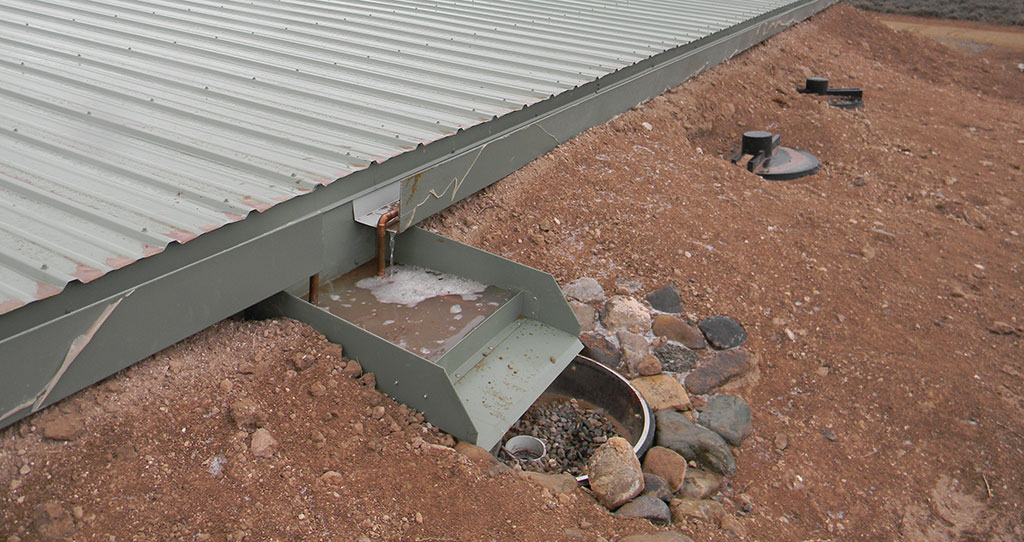The average American uses 80 -100 gallons of water per day. Less than half is used for cooking or drinking, all of it is most likely treated, potable water from the local municipality.
Potable Water: water that is safe to drink or to use for food preparation, without risk of health problems.
Alternatively, water can be ‘harvested’ or ‘caught’ from the sky and gathered or stored in cisterns. This ‘catch water’ is then filtered to make ready for human consumption and use through filters.

The cisterns can be buried, preferably above ground or integrated into the interior of the building and used as a heat sink and optionally have a small waterfall incorporated.
The Cistern(s) can be ‘inter-tied’ to connect to municipal water so that when the water gets low, to a prescribed level, more water can be automatically added.
Catching the Water
Water is caught from a roof with a potable surface. From the roof, the water is channeled through silt catches into cisterns. Cisterns are sized to the local climate and are best buried and completely protected from the sun. The water from the cistern is gravity-fed into a Water Organizing Module with a pump and filter. The pump pushes the water into a pressure tank to supply code required water pressure. The filters clean the water for consumption and cleaning.
WOM – Water Organizing Module
Steps to Reduce Water Use
Water efficiency is the smart use of our water resources through water-saving technologies and simple steps we can all take around the house. Using water efficiently will help ensure reliable water supplies today and for future generations. Best of all, everyone can play their part in preserving our water sources.
Small household leaks can add up to gallons of water lost every day. Check plumbing fixtures and irrigation systems each year.
- Toilet Leaks
- Faucet Leaks
- Shower Head Leaks
The average household’s leaks can account for more than 10,000 gallons of water wasted every year and ten percent of homes have leaks that waste 90 gallons or more per day.
A Time to Change: Building Resilient, Off-Grid Homes in Post-Hurricane Florida
In the aftermath of yet another devastating hurricane season, Florida finds itself grappling with the staggering loss of homes, infrastructure, and communities. This isn’t just a time for rebuilding—it’s a time to rethink how
50-Gal Hybrid HeatPump Electric Water Heater
If you're searching for an energy-efficient, reliable, and eco-friendly water heater for your home, the Rheem Performance Platinum 50-Gallon Hybrid Electric Water Heater is the top choice. With advanced hybrid heat pump technology, smart
What is a Heat Pump Water Heater?
Heat pump hot water heaters, also known as hybrid hot water heaters, are the most energy-efficient type of water heater available on the market. A heat pump water heater (HPWH) is a type of
4 Amazing Offgrid Architectural Designs
OFF-THE-GRID LIVING is experiencing a renaissance. Dwellings devised to support a sustainable lifestyle could help us adapt to some of our biggest present-day challenges—from a lack of housing for the world’s growing population to pollution
Acequias and Homesteading: Sustaining Harmony through Water Management and Self-Sufficiency
Homesteading, a way of life characterized by self-sufficiency and independence, and acequias, a centuries-old system of water management, hold profound historical significance and offer valuable insights into sustainable living. Together, they present a holistic




